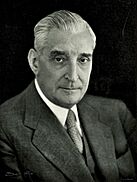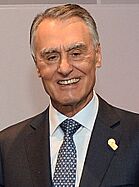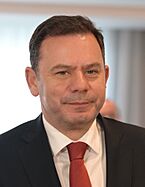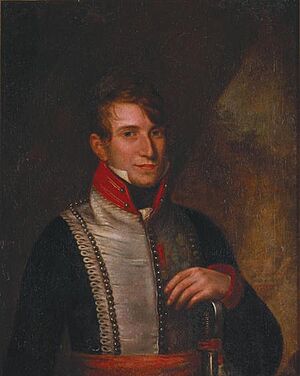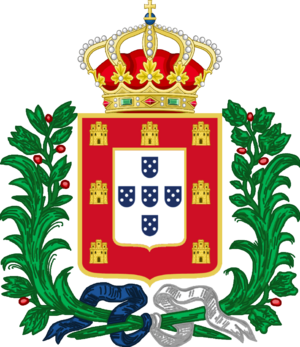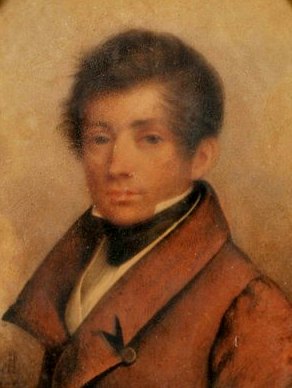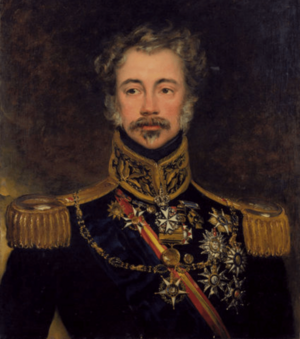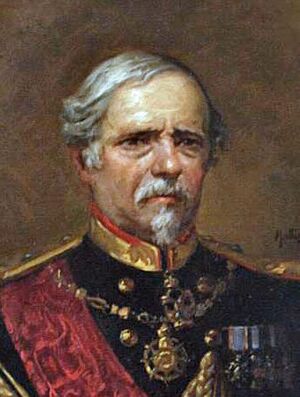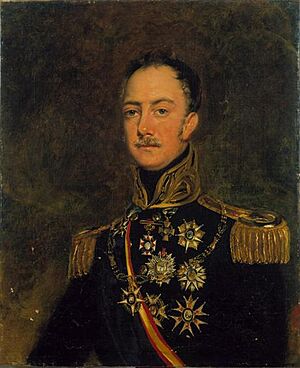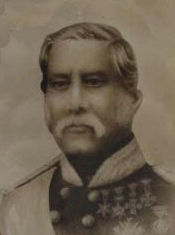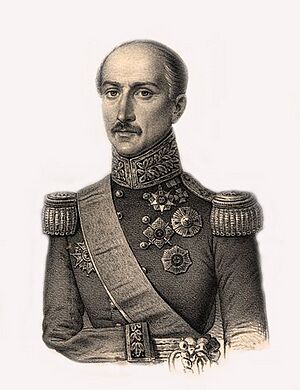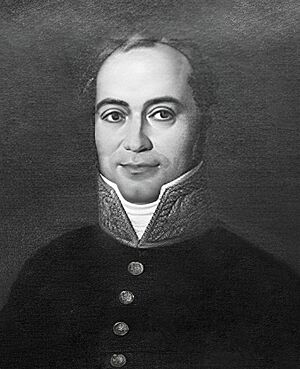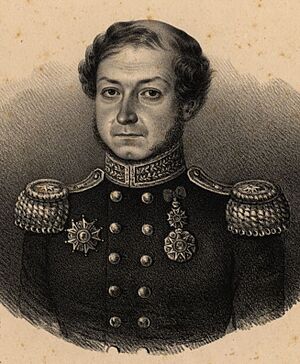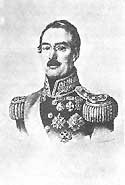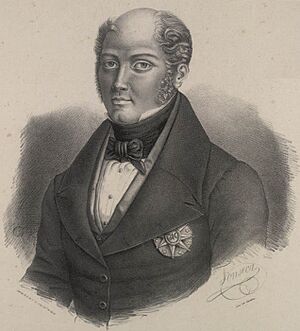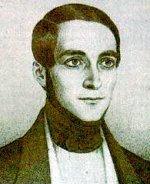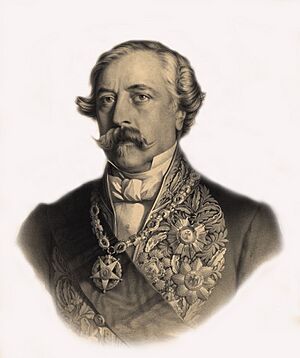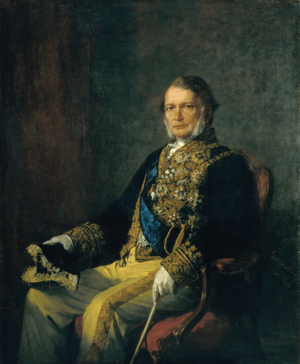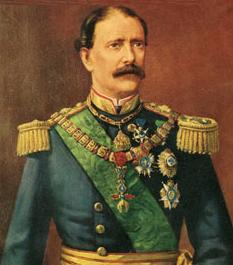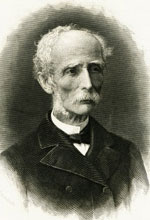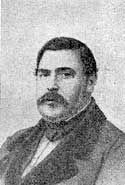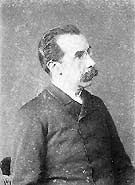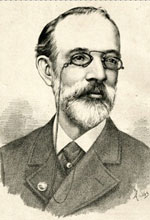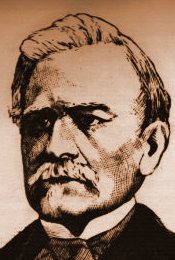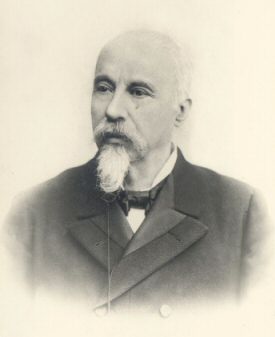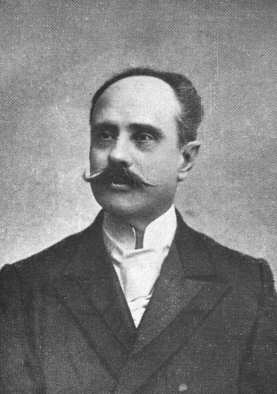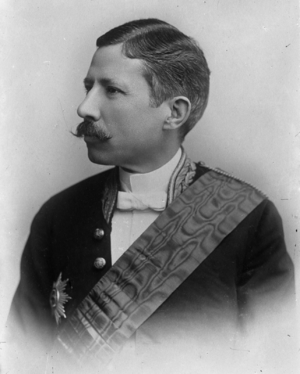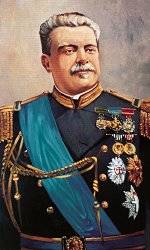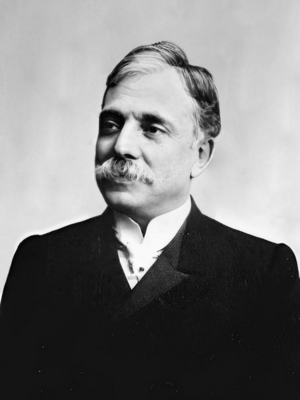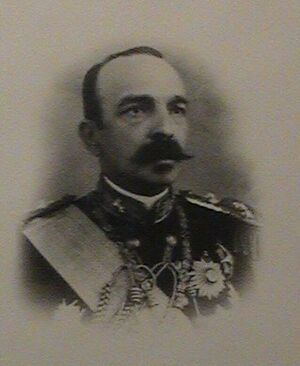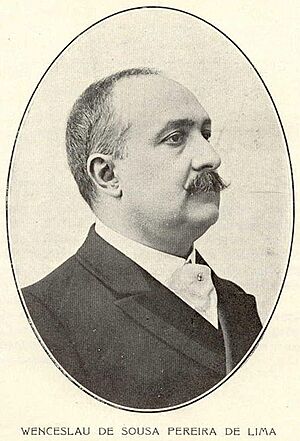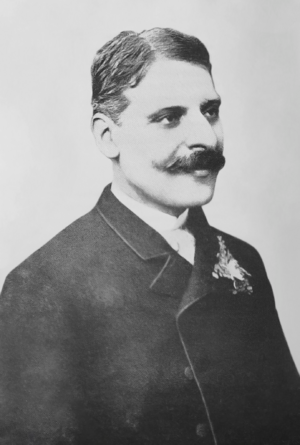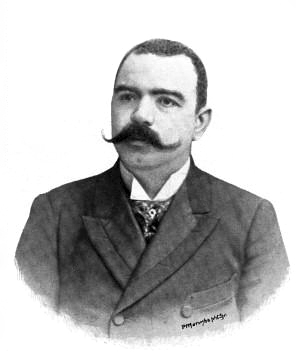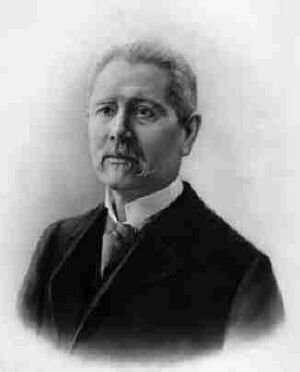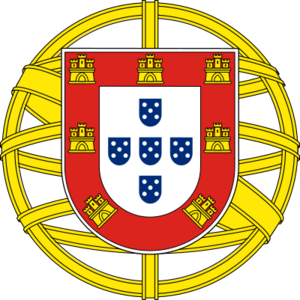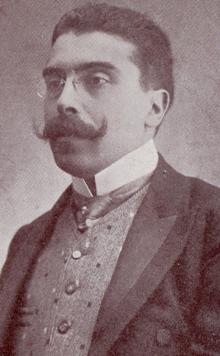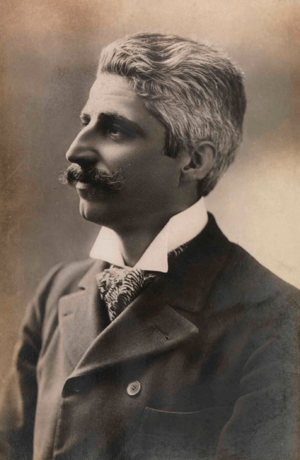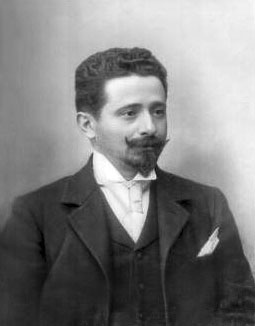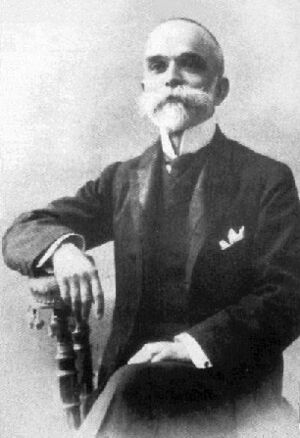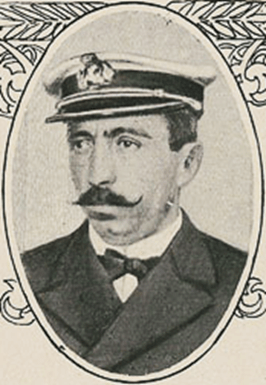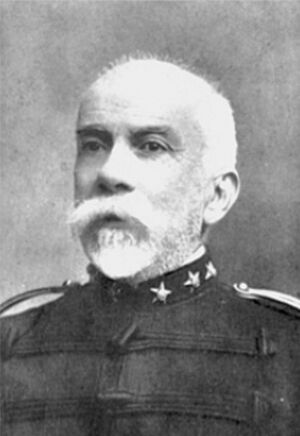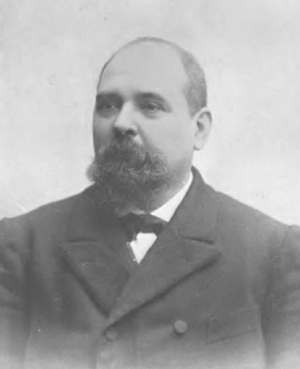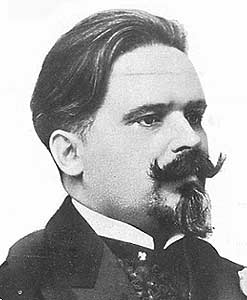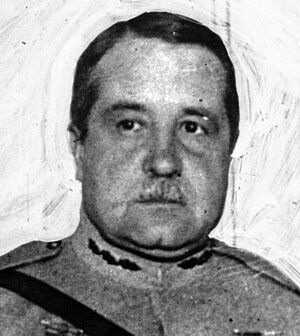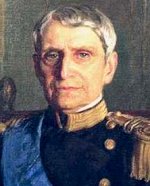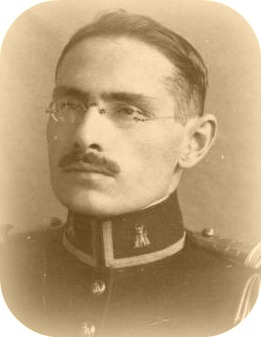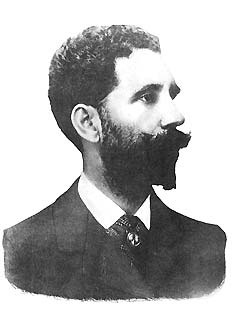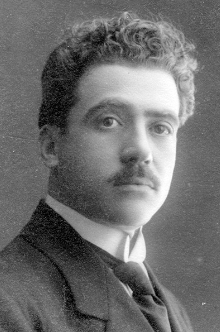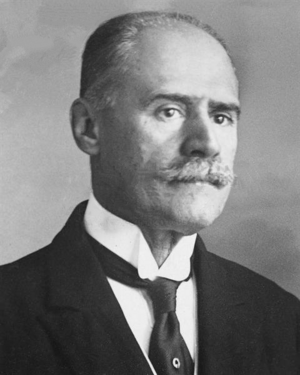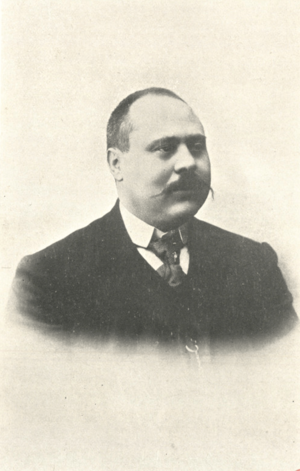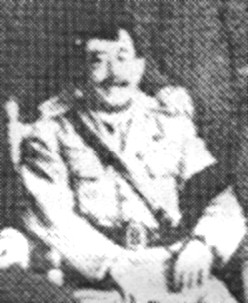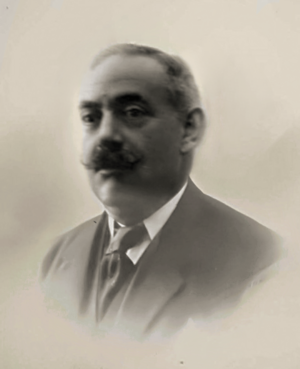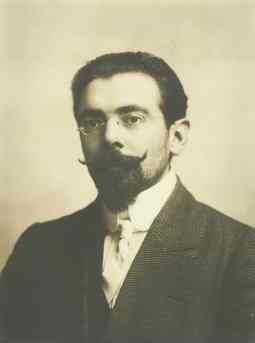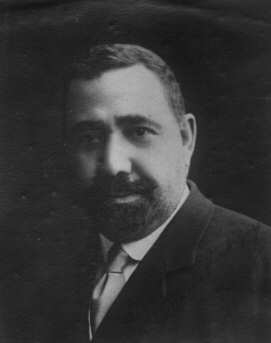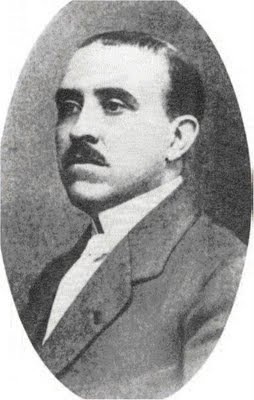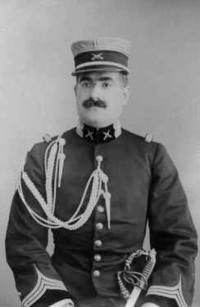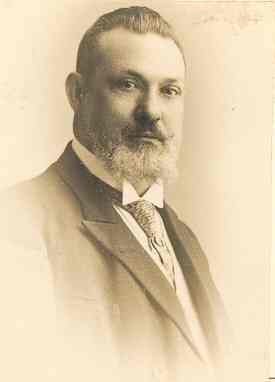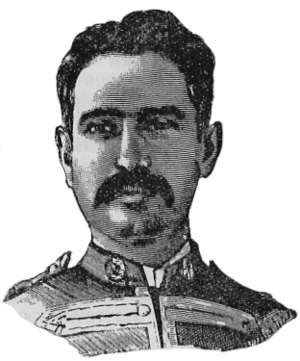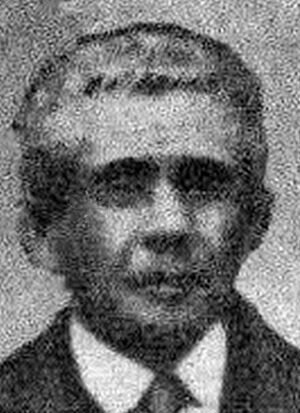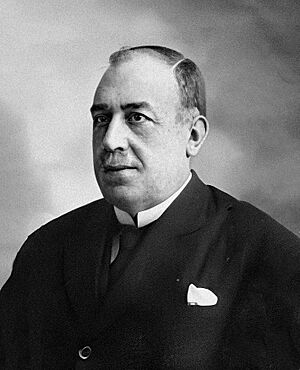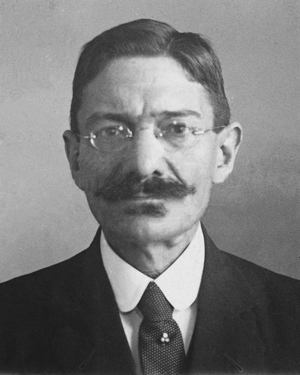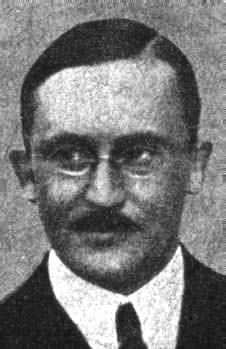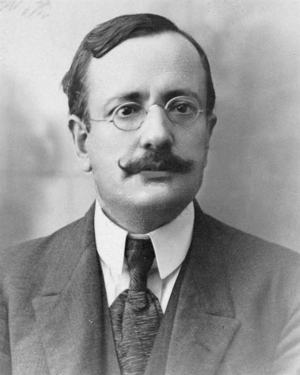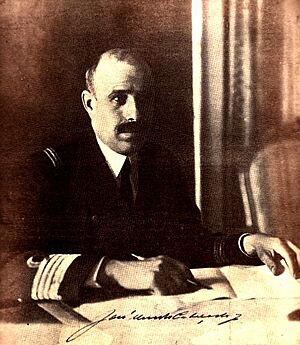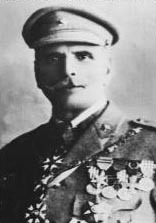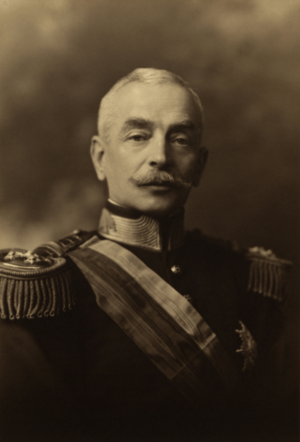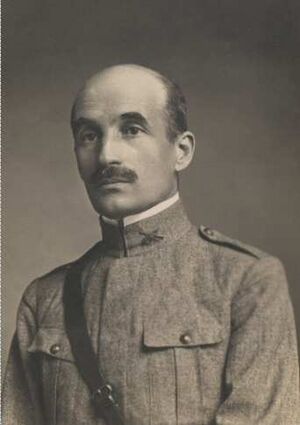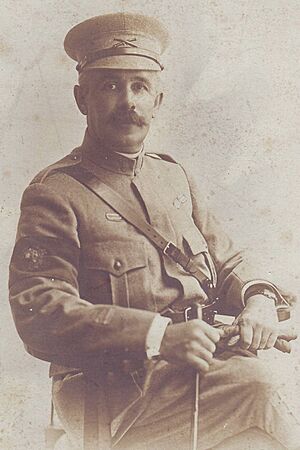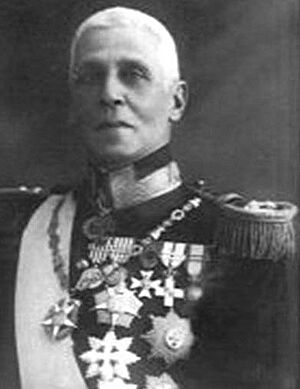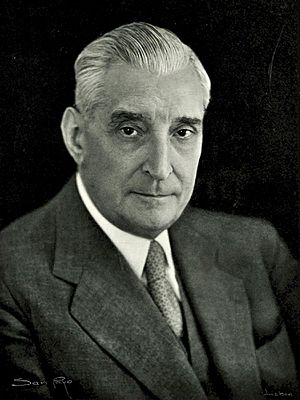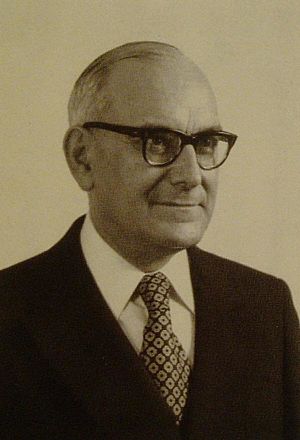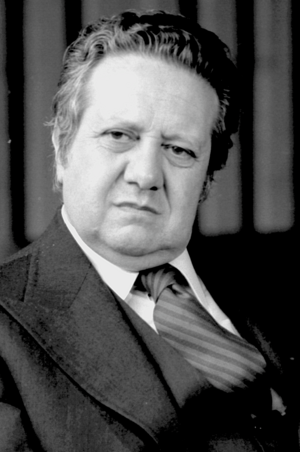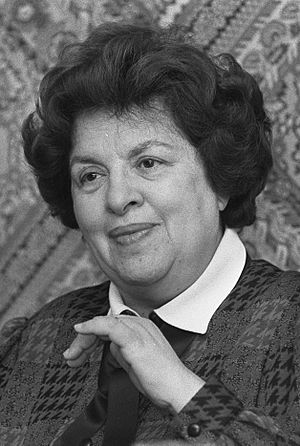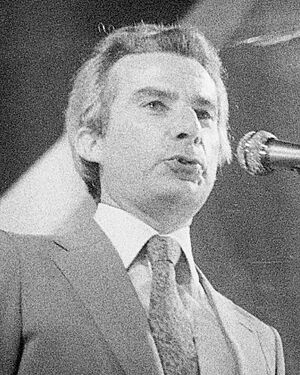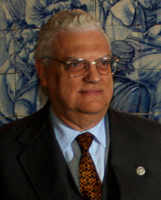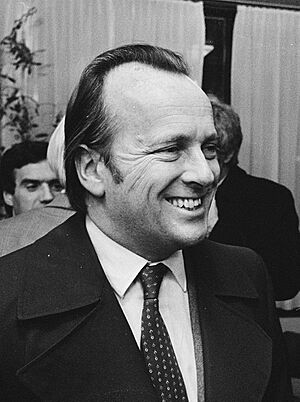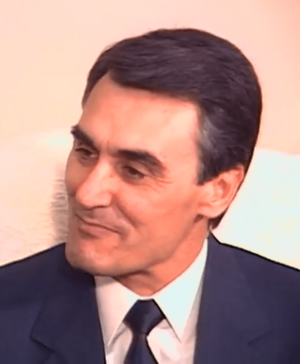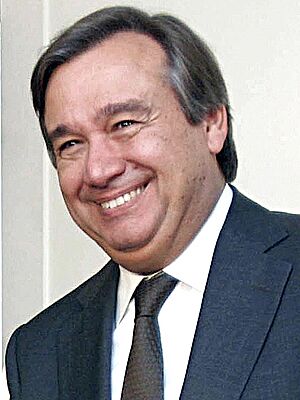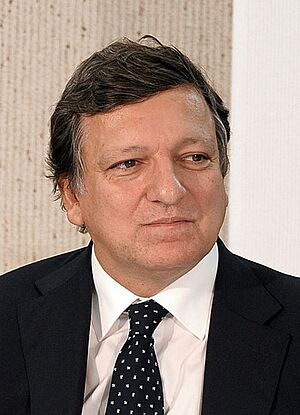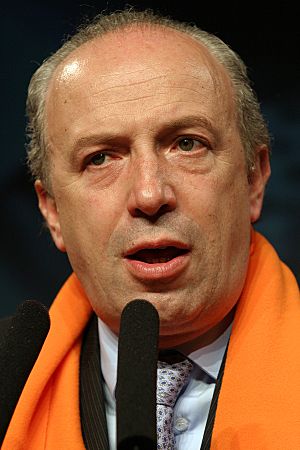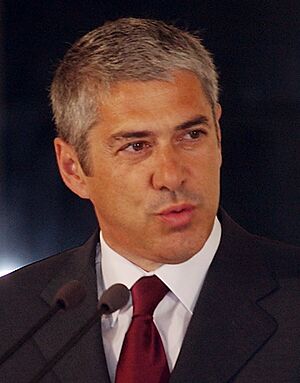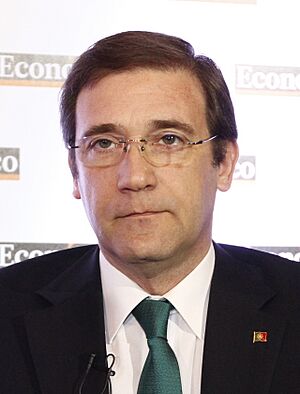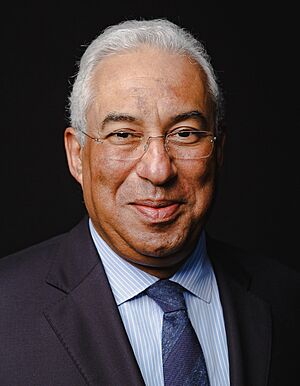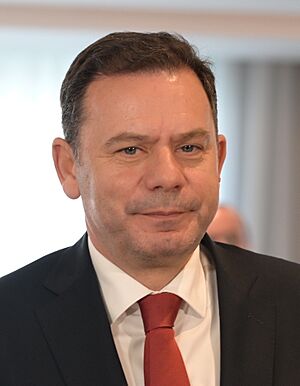List of prime ministers of Portugal facts for kids
- Top left: Pedro de Sousa Holstein, 1st Duke of Palmela was the first prime minister to be referred as such.
- Top right: António de Oliveira Salazar was the longest serving head of government.
- Bottom left: Aníbal Cavaco Silva was the longest serving prime minister in democracy.
- Bottom right: Luís Montenegro is the current prime minister.
The Prime Minister of Portugal is the leader of the Government of Portugal. This important person makes sure all government ministers work together. They also represent the government and report to the Assembly of the Republic. The prime minister also keeps the President of Portugal updated on government actions.
There is no limit to how many times someone can be prime minister. The President chooses the prime minister after elections. Usually, the leader of the party that gets the most votes becomes prime minister.
The prime minister's official home is a large house next to São Bento Palace. People often call it "São Bento Palace" by mistake. However, many prime ministers have chosen not to live there during their time in office.
Contents
How the Prime Minister's Role Began: A Look at History
The idea of a prime minister in Portugal goes way back to the 12th century. Back then, one important official would help the king of Portugal manage the kingdom. This person was like an early version of a prime minister. Over time, different titles were used for this role, such as Mordomo-Mor (Mayor of the Palace) or Secretário de Estado (Secretary of State).
In 1736, three Secretary of State offices were created. The Secretary of State for Internal Affairs was the most important.
Changes During the Liberal Period (1820s-1910)
After the 1820 Liberal Revolution of Porto, Portugal became more democratic. During this time, several Secretaries of State had equal power. But the Minister of the Kingdom (Internal Affairs) was still very important. Sometimes, there was a "Minister Assistant to the Dispatch." This person coordinated all the secretaries, much like a prime minister.
Later, with the Constitutional Monarchy, the title changed to "President of the Council of Ministers." These presidents were clearly the heads of government. They held executive power, but the National Congress limited their power.
The First Republic (1910-1926)
When Portugal became a Republic in the 5 October 1910 revolution, the head of government was called "President of the Ministry." During this period, the parliament had a lot of power. Because of this, governments often changed quickly due to political and social problems.
The Second Republic: Dictatorship and the New State (1926-1974)
After the 28 May 1926 coup d'état, Portugal entered a period of military rule. Later, the Estado Novo (New State) was formed. This was a strong, centralized government. The prime minister was again called "President of the Council of Ministers." This person became the most powerful figure in the country. António de Oliveira Salazar and then Marcello Caetano held this position for almost 42 years.
The Third Republic: Democracy Returns (1974-Present)
The Carnation Revolution in 1974 brought democracy back to Portugal. After this, the title of "Prime Minister" was used again, replacing the "President of the Council."
Prime Ministers of Portugal: A Detailed List
The official list of prime ministers begins with the first President of the Council of Ministers from the time of the constitutional monarchy. Additional columns help track the numbering of prime ministers within different periods, like the First Republic, Second Republic, and Third Republic.
A column on the right shows the official numbering of the "Constitutional Governments." This numbering is different from the prime minister count. A new constitutional government starts whenever new elections happen, even if the same prime minister stays. Also, if a prime minister is replaced during their term, a new constitutional government begins. This means there are more constitutional governments than prime ministers.
The colors in the table show which political party each prime minister belonged to.
No party/independent
Chartist/Chamorro
Chamorro
Septemberist
Regenerator
Historic
Reformist
Regenerator/Historic
Progressist
Liberal Regenerator
Republican
Democratic
National Republican/Sidonist
Republican Liberal
Reconstitution Party
Nationalist Republican
Democratic Leftwing Republican
National Union/People's National Action
Democratic Renewal Party
Socialist
Social Democratic
Democratic and Social Centre
Constitutional Monarchy – Second Liberalism (1834–1910)
| No. | Portrait | Name (Birth–Death) |
Term of office — Electoral mandates |
Political party | Government | Monarch (Reign) |
|
|---|---|---|---|---|---|---|---|
| 1 | Pedro de Sousa Holstein, Marquis of Palmela (1781–1850) |
24 September 1834 |
4 May 1835 |
Chartist/"Chamorro" | 1st Dev. | Maria II (1834–1853) and Fernando II (1837–1853) |
|
| 1834 | |||||||
| Portugal's first official prime minister. This was the first government of the Devorismo period. | |||||||
| 2 | Vitório Maria de Sousa Coutinho, Count of Linhares (1790–1857) |
4 May 1835 |
27 May 1835 |
"Chamorro" | |||
| — | |||||||
| 3 | João Carlos de Saldanha Oliveira e Daun, Marquis of Saldanha (1790–1876) |
27 May 1835 |
18 November 1835 |
Independent | 2nd Dev. | ||
| — | |||||||
| Second Devorismo government. He resigned after disagreements about land sales and military help for Spain. | |||||||
| 4 | José Jorge Loureiro (1791–1860) |
18 November 1835 |
20 April 1836 |
Independent | 3rd Dev. | ||
| — | |||||||
| Third Devorismo government. The government ended because they couldn't pass a budget. | |||||||
| 5 | António José Severim de Noronha, Duke of Terceira and Marquis of Vila Flor (1792–1860) |
20 April 1836 |
10 September 1836 |
"Chamorro" | 4th Dev. | ||
| Jul.1836 | |||||||
| Fourth and last Devorismo government. The September Revolution happened during his term. | |||||||
| 6 | José da Gama Carneiro e Sousa, Count of Lumiares (1788–1849) |
10 September 1836 |
4 November 1836 |
Septemberist | 1st Set. | ||
| — | |||||||
| Queen Maria II of Portugal tried to remove the government. He resigned afterward. | |||||||
| — | José Bernardino de Portugal e Castro, Marquis of Valença and Count of Vimioso (1780–1840) (did not take office) |
4 November 1836 |
5 November 1836 |
Independent | — | ||
| — | |||||||
| He was appointed but did not actually start his term. | |||||||
| 7 | Bernardo de Sá Nogueira de Figueiredo, Viscount of Sá da Bandeira (1795–1876) |
5 November 1836 |
1 June 1837 |
Septemberist | 2nd Set. | ||
| Nov.1836 | |||||||
| He reformed local governments. Slavery traffic was stopped in Portuguese colonies. | |||||||
| 8 | António Dias de Oliveira (1804–1863) |
1 June 1837 |
2 August 1837 |
Septemberist | 3rd Set. | ||
| — | |||||||
| The Revolt of the Marshals happened during his term. | |||||||
| 9 | Bernardo de Sá Nogueira de Figueiredo, Viscount of Sá da Bandeira (2nd time) (1795–1876) |
2 August 1837 |
18 April 1839 |
Septemberist | 4th Set. | ||
| 1838 | |||||||
| The Portuguese Constitution of 1838 was approved. | |||||||
| 10 | Rodrigo Pinto Pizarro de Almeida Carvalhais, Baron of Ribeira de Sabrosa (1788–1841) |
18 April 1839 |
26 November 1839 |
Septemberist | 5th Set. | ||
| — | |||||||
| This was the last government fully led by the Septemberist party. | |||||||
| 11 | José Lúcio Travassos Valdez, Count of Bonfim (1787–1862) |
26 November 1839 |
9 June 1841 |
Septemberist | 6th Set. | ||
| 1840 | |||||||
| This was a coalition government. Portugal restarted diplomatic relations with other European countries. | |||||||
| 12 | Joaquim António de Aguiar (1792–1884) |
9 June 1841 |
7 February 1842 |
Septemberist | 7th Set. | ||
| — | |||||||
| He was known for his role in closing monasteries in Portugal. He resigned after the 1826 Constitutional Charter was restored. | |||||||
| 13 | Pedro de Sousa Holstein, Marquis of Palmela (2nd time) (1781–1850) |
7 February 1842 |
9 February 1842 |
Independent | G.E. | ||
| — | |||||||
| This government lasted only 3 days. It marked the start of a period called Cabralism. | |||||||
| 14 | António José Severim de Noronha, Duke of Terceira and Marquis of Vila Flor (2nd time) (1792–1860) |
9 February 1842 |
20 May 1846 |
Chartist | 1st R. Cart. | ||
| 1842, 1845 | |||||||
| Known as the "Restoration Government." He resigned after the Revolution of Maria da Fonte and went into exile. This ended Cabralism. | |||||||
| 15 | Pedro de Sousa Holstein, Marquis of Palmela (3rd time) (1781–1850) |
20 May 1846 |
6 October 1846 |
Chartist | 2nd R. Cart. | ||
| — | |||||||
| A palace coup called Emboscada happened during his term. | |||||||
| 16 | João Carlos de Saldanha Oliveira e Daun, Duke of Saldanha (2nd time) (1790–1876) |
6 October 1846 |
18 June 1849 |
Chartist | 3rd R. Cart. | ||
| 1847 | |||||||
| The Patuleia or Little Civil War happened, which led to a Chartist victory. | |||||||
| 17 | António Bernardo da Costa Cabral, Count of Tomar (1803–1889) |
18 June 1849 |
26 April 1851 |
Chartist | 4th R. Cart. | ||
| — | |||||||
| He returned from exile. He resigned due to political and military unrest. | |||||||
| 18 | António José Severim de Noronha, Duke of Terceira and Marquis of Vila Flor (3rd time) (1792–1860) |
26 April 1851 |
1 May 1851 |
Regenerator | 5th R. Cart. | ||
| — | |||||||
| A military uprising happened on May 1, 1851. This marked the start of the Regeneration period. | |||||||
| 19 | João Carlos de Saldanha Oliveira e Daun, Duke of Saldanha (3rd time) (1790–1876) |
1 May 1851 |
6 June 1856 |
Regenerator | 1st Reg. | ||
| 1851, 1852 | Pedro V (1853–1861) |
||||||
| Queen Maria II of Portugal died, and Pedro V became king. | |||||||
| 20 | Nuno José Severo de Mendonça Rolim de Moura Barreto, Duke of Loulé (1804–1875) |
6 June 1856 |
16 March 1859 |
Historic | 2nd Reg. | ||
| 1856, 1858 | |||||||
| The first railway line in Portugal opened on October 28, 1856. | |||||||
| 21 | António José Severim de Noronha, Duke of Terceira and Marquis of Vila Flor (4th time) (1792–1860) |
16 March 1859 |
1 May 1860 (died) |
Regenerator | 3rd Reg. | ||
| 1860 | |||||||
| He died in office from pneumonia. | |||||||
| 22 | Joaquim António de Aguiar (2nd time) (1792–1884) |
1 May 1860 |
4 July 1860 |
Regenerator | |||
| — | |||||||
| 23 | Nuno José Severo de Mendonça Rolim de Moura Barreto, Duke of Loulé (2nd time) (1804–1875) |
4 July 1860 |
17 April 1865 |
Historic | 4th Reg. | ||
| 1861, 1864 | Luis I (1861–1889) |
||||||
| King Pedro V of Portugal died, and Luís I became king. | |||||||
| 24 | Bernardo de Sá Nogueira de Figueiredo, Marquis of Sá da Bandeira (3rd time) (1795–1876) |
17 April 1865 |
4 September 1865 |
Reformist | 5th Reg. | ||
| — | |||||||
| 25 | Joaquim António de Aguiar (3rd time) (1792–1884) |
4 September 1865 |
4 January 1868 |
Regenerator (with the Historic Party) | 6th Reg. | ||
| 1865, 1867 | |||||||
| This government was called the "Ministry of Fusion." He had to resign after the Janeirinha uprising. | |||||||
| 26 | António José de Ávila, Duke of Ávila and Bolama (1807–1881) |
4 January 1868 |
22 July 1868 |
Independent (with Reformists) |
7th Reg. | ||
| — | |||||||
| He removed the tax that caused the Janeirinha uprising. He resigned because of the country's poor economy. | |||||||
| 27 | Bernardo de Sá Nogueira de Figueiredo, Marquis of Sá da Bandeira (4th time) (1795–1876) |
22 July 1868 |
11 August 1869 |
Reformist | 8th Reg. | ||
| 1868, 1869 | |||||||
| Slavery was abolished in all Portuguese territories. | |||||||
| 28 | Nuno José Severo de Mendonça Rolim de Moura Barreto, Duke of Loulé (3rd time) (1804–1875) |
11 August 1869 |
19 May 1870 |
Historic (with Reformists) |
9th Reg. | ||
| Mar.1870 | |||||||
| He was forced to resign after coups led by the Duke of Saldanha. | |||||||
| 29 | João Carlos de Saldanha Oliveira e Daun, Duke of Saldanha (4th time) (1790–1876) |
19 May 1870 |
29 August 1870 |
Regenerator | 10th Reg. | ||
| — | |||||||
| King Luis I dismissed him. | |||||||
| 30 | Bernardo de Sá Nogueira de Figueiredo, Marquis of Sá da Bandeira (5th time) (1795–1876) |
29 August 1870 |
29 October 1870 |
Reformist | 11th Reg. | ||
| Sep.1870 | |||||||
| King Luis I appointed him. | |||||||
| 31 | António José de Ávila, Marquis of Ávila (2nd time) (1807–1881) |
29 October 1870 |
13 September 1871 |
Reformist | 12th Reg. | ||
| 1871 | |||||||
| 32 | António Maria de Fontes Pereira de Melo (1819–1887) |
13 September 1871 |
6 March 1877 |
Regenerator | 13th Reg. | ||
| 1874 | |||||||
| He was the longest-serving Prime Minister in the Constitutional Monarchy. He focused on industry and public works, and reformed education. This started the industrialization process. | |||||||
| 33 | António José de Ávila, Marquis of Ávila (3rd time) (1807–1881) |
6 March 1877 |
26 January 1878 |
Reformist | 14th Reg. | ||
| — | |||||||
| 34 | António Maria de Fontes Pereira de Melo (2nd time) (1819–1887) |
26 January 1878 |
29 May 1879 |
Regenerator | 15th Reg. | ||
| 1878 | |||||||
| He resigned because of a financial problem involving the National Overseas Bank. | |||||||
| 35 | Anselmo José Braamcamp de Almeida Castelo Branco (1817–1885) |
29 May 1879 |
23 March 1881 |
Progressist | 16th Reg. | ||
| 1879 | |||||||
| His government ended after a vote of no confidence in Parliament. | |||||||
| 36 | António Rodrigues Sampaio (1806–1882) |
23 March 1881 |
14 November 1881 |
Regenerator | 17th Reg. | ||
| 1881 | |||||||
| 37 | António Maria de Fontes Pereira de Melo (3rd time) (1819–1887) |
14 November 1881 |
16 February 1886 |
Regenerator | |||
| 1884 | |||||||
| He made reforms to the Portuguese Army. | |||||||
| 38 | José Luciano de Castro Pereira Côrte-Real (1834–1914) |
16 February 1886 |
14 January 1890 |
Progressist | 18th Reg. | ||
| 1887, 1889 | Carlos I (1889–1908) |
||||||
| The "Pink Map" crisis happened. King Luís I died, and Carlos I became king. The 1890 British Ultimatum was issued. | |||||||
| 39 | António de Serpa Pimentel (1825–1900) |
14 January 1890 |
11 October 1890 |
Regenerator | 19th Reg. | ||
| 1890 | |||||||
| He resigned because of the proposed Anglo-Portuguese Treaty of 1891. | |||||||
| 40 | João Crisóstomo de Abreu e Sousa (1811–1895) |
11 October 1890 |
18 January 1892 |
Independent | 20th Reg. | ||
| — | |||||||
| A rebellion happened in Porto on January 31, 1891. The Anglo-Portuguese Treaty of 1891 was signed. | |||||||
| 41 | José Dias Ferreira (1837–1909) |
18 January 1892 |
22 February 1893 |
Independent | 21st Reg. | ||
| 1892 | |||||||
| He formed a government to calm the political crisis between the Regenerators and Progressives. | |||||||
| 42 | Ernesto Rodolfo Hintze Ribeiro (1849–1907) |
22 February 1893 |
5 February 1897 |
Regenerator | 22nd Reg. | ||
| 1894, 1895 | |||||||
| He granted self-rule to the Azores and Madeira islands. New laws were passed for pharmacies and forests. | |||||||
| 43 | José Luciano de Castro Pereira Côrte-Real (2nd time) (1834–1914) |
5 February 1897 |
26 July 1900 |
Progressist | 23rd Reg. | ||
| 1897, 1899 | |||||||
| The city of Porto was quarantined in 1899 due to the bubonic plague. | |||||||
| 44 | Ernesto Rodolfo Hintze Ribeiro (2nd time) (1849–1907) |
26 July 1900 |
20 October 1904 |
Regenerator | 24th Reg. | ||
| 1900, 1901, 1904 | |||||||
| An electoral law was passed that made it harder for opponents of the Regenerators to be elected. | |||||||
| 45 | José Luciano de Castro Pereira Côrte-Real (3rd time) (1834–1914) |
20 October 1904 |
19 March 1906 |
Progressist | 25th Reg. | ||
| 1905 | |||||||
| This period was marked by the "Tobacco Issue" controversy. | |||||||
| 46 | Ernesto Rodolfo Hintze Ribeiro (3rd time) (1849–1907) |
19 March 1906 |
19 May 1906 |
Regenerator | 26th Reg. | ||
| Apr.1906 | |||||||
| He resigned after only 57 days in government due to police actions against republicans. | |||||||
| 47 | João Ferreira Franco Pinto Castelo-Branco (1855–1929) |
19 May 1906 |
4 February 1908 |
Liberal Regenerator | 27th Reg. | ||
| Aug.1906 | |||||||
| He established a strong government. The Municipal Library Elevator Coup happened on January 28, 1908. King Carlos I and other royal family members were killed in the Lisbon Regicide. Manuel II became king. | |||||||
| 48 | Francisco Joaquim Ferreira do Amaral (1844–1923) |
4 February 1908 |
26 December 1908 |
Independent | 28th Reg. | Manuel II (1908–1910) |
|
| 1908 | |||||||
| This was a "government of calm" after the assassination of King Carlos I. | |||||||
| 49 | Artur Alberto de Campos Henriques (1853–1922) |
26 December 1908 |
11 April 1909 |
Independent (Regenerator and Progressist) |
29th Reg. | ||
| — | |||||||
| 50 | Sebastião Custódio de Sousa Teles (1847–1921) |
11 April 1909 |
14 May 1909 |
Independent | 30th Reg. | ||
| — | |||||||
| The 1909 Benavente earthquake happened during his term. | |||||||
| 51 | Venceslau de Sousa Pereira de Lima (1858–1919) |
14 May 1909 |
22 December 1909 |
Independent | 31st Reg. | ||
| — | |||||||
| 52 | Francisco António da Veiga Beirão (1841–1916) |
22 December 1909 |
26 June 1910 |
Regenerator | 32nd Reg. | ||
| — | |||||||
| 53 | António Teixeira de Sousa (1857–1917) |
26 June 1910 |
5 October 1910 |
Regenerator | 33rd Reg. | ||
| 1910 | |||||||
| The 5 October 1910 revolution happened, ending the Monarchy. The royal family went into exile. | |||||||
First Republic (1910–1926)
| No. | Portrait | Name (Birth–Death) |
Term of office — Electoral mandates |
Political party | Government | President (Mandate) |
|
|---|---|---|---|---|---|---|---|
| 54 | Joaquim Teófilo Fernandes Braga (1843–1924) |
5 October 1910 |
4 September 1911 |
Republican | 1st | Teófilo Braga (1910–1911) |
|
| 1911 | |||||||
| The 5 October 1910 revolution occurred. The 1911 Constitution was adopted. A new flag and national anthem were chosen. The government took control of Catholic Church property. | |||||||
| 55 | João Pinheiro Chagas (1863–1925) |
4 September 1911 |
13 November 1911 |
Republican | 2nd | Manuel de Arriaga (1911–1915) |
|
| — | |||||||
| 56 | Augusto César de Almeida de Vasconcelos Correia (1867–1951) |
13 November 1911 |
16 June 1912 |
Republican | 3rd | ||
| — | |||||||
| 57 | Duarte Leite Pereira da Silva (1864–1950) |
16 June 1912 |
23 September 1912 |
Republican | 4th | ||
| — | |||||||
| A royalist attack happened in Chaves. | |||||||
| — | Augusto César de Almeida de Vasconcelos Correia (1867–1951) (interim) |
23 September 1912 |
30 September 1912 |
Republican | |||
| — | |||||||
| Duarte Leite Pereira da Silva (1864–1950) |
30 September 1912 |
9 January 1913 |
Republican | ||||
| — | |||||||
| 58 | Afonso Augusto da Costa (1871–1937) |
9 January 1913 |
9 February 1914 |
Democratic | 5th | ||
| — | |||||||
| 59 | Bernardino Luís Machado Guimarães (1851–1944) |
9 February 1914 |
12 December 1914 |
Democratic | 6th, 7th | ||
| — | |||||||
| Portugal's involvement in World War I began. | |||||||
| 60 | Victor Hugo de Azevedo Coutinho (1871–1955) |
12 December 1914 |
28 January 1915 |
Democratic | 8th | ||
| — | |||||||
| 61 | Joaquim Pereira Pimenta de Castro (1846–1918) |
28 January 1915 |
14 May 1915 |
Independent | 9th | ||
| — | |||||||
| — | Constitutional Junta composed of: José Norton de Matos António Maria da Silva José de Freitas Ribeiro Alfredo de Sá Cardoso Álvaro de Castro |
14 May 1915 |
15 May 1915 |
None | — | ||
| — | |||||||
| — | João Pinheiro Chagas (did not take office) (1863–1925) |
15 May 1915 |
17 May 1915 |
Independent | 10th, 11th | ||
| — | |||||||
| 62 | José Augusto Soares Ribeiro de Castro (1868–1929) |
17 May 1915 |
29 November 1915 |
Democratic | Teófilo Braga (1915) |
||
| 1915 | |||||||
| 63 | Afonso Augusto da Costa (2nd time) (1871–1937) |
29 November 1915 |
16 March 1916 |
Democratic | 12th | Bernardino Machado (1915–1917) |
|
| — | |||||||
| Germany declared war on Portugal. | |||||||
| 64 | António José de Almeida (1866–1929) |
16 March 1916 |
25 April 1917 |
Sacred Union (Evolutionist Party with the Democrats) |
13th | ||
| — | |||||||
| 65 | Afonso Augusto da Costa (3rd time) (1871–1937) |
25 April 1917 |
7 October 1917 |
Democratic | 14th | ||
| — | |||||||
| This was a "Sacred Union" government. | |||||||
| — | José Maria Mendes Ribeiro Norton de Matos (1867–1955) (interim) |
7 October 1917 |
25 October 1917 |
Democratic | |||
| — | |||||||
| Afonso Augusto da Costa (1871–1937) |
25 October 1917 |
17 November 1917 |
Democratic | ||||
| — | |||||||
| José Maria Mendes Ribeiro Norton de Matos (1867–1955) (interim) |
17 November 1917 |
8 December 1917 |
Democratic | ||||
| — | |||||||
| A coup happened in December 1917. | |||||||
| 66 | Sidónio Bernardino Cardoso da Silva Pais (1872–1918) |
8 December 1917 |
14 December 1918 (died) |
National Republican | 15th, 16th | Sidónio Pais (1918) |
|
| 1918 | |||||||
| He was known as the "President-King" and established a strong government. The Spanish flu outbreak occurred. He was assassinated. | |||||||
| 67 | João do Canto e Castro da Silva Antunes Júnior (1862–1934) |
14 December 1918 |
23 December 1918 |
National Republican | João do Canto e Castro (1918–1919) |
||
| — | |||||||
| 68 | João Tamagnini de Sousa Barbosa (1883–1948) |
23 December 1918 |
27 January 1919 |
National Republican | 17th, 18th | ||
| — | |||||||
| The Monarchy of the North was declared during his term. | |||||||
| 69 | José Maria Mascarenhas Relvas (1858–1929) |
27 January 1919 |
30 March 1919 |
Independent | 19th | ||
| — | |||||||
| 70 | Domingos Leite Pereira (1882–1956) |
30 March 1919 |
30 June 1919 |
Independent | 20th | ||
| — | |||||||
| 71 | Alfredo Ernesto de Sá Cardoso (1864–1950) |
30 June 1919 |
15 January 1920 |
Democratic | 21st | ||
| 1919 | |||||||
| — | Francisco José Fernandes Costa (did not take office) (1857–1925) |
15 January 1920 |
Republican Liberal | 22nd | António José de Almeida (1919–1923) |
||
| — | |||||||
| He resigned before being sworn in. This was known as the "Five minutes government." | |||||||
| — | Alfredo Ernesto de Sá Cardoso (reconducted) (1864–1950) |
15 January 1920 |
21 January 1920 |
Democratic | 21st | ||
| — | |||||||
| He was asked to form a government again but only lasted 6 days. | |||||||
| 72 | Domingos Leite Pereira (2nd time) (1882–1956) |
21 January 1920 |
8 March 1920 |
Independent | 23rd | ||
| — | |||||||
| 73 | António Maria Baptista (1866–1920) |
8 March 1920 |
6 June 1920 (died) |
Democratic | 24th | ||
| — | |||||||
| He died during a meeting of the council of ministers. | |||||||
| 74 | José Ramos Preto (1871–1949) |
6 June 1920 |
26 June 1920 |
Democratic | |||
| — | |||||||
| He resigned just 12 days after starting his term. This was due to public anger over increased salaries for government staff. | |||||||
| 75 | António Maria da Silva (1872–1950) |
26 June 1920 |
19 July 1920 |
Democratic (with the Socialists and Populars) |
25th | ||
| — | |||||||
| 76 | António Joaquim Granjo (1881–1921) |
19 July 1920 |
20 November 1920 |
Republican Liberal (with the Reconstitution Party) |
26th | ||
| — | |||||||
| 77 | Álvaro Xavier de Castro (1878–1928) |
20 November 1920 |
30 November 1920 |
Democratic (with Reconstitution Party and Populars) |
27th | ||
| — | |||||||
| He held office for only 10 days. | |||||||
| 78 | Liberato Damião Ribeiro Pinto (1880–1949) |
30 November 1920 |
2 March 1921 |
Democratic (with Reconstitution Party and Populars) |
28th | ||
| — | |||||||
| There was social unrest and calls for a dictatorship during his term. | |||||||
| 79 | Bernardino Luís Machado Guimarães (2nd time) (1851–1944) |
2 March 1921 |
23 May 1921 |
Democratic (with Reconstitution Party and Populars) |
29th | ||
| — | |||||||
| He was forced to resign after being accused of planning a coup. | |||||||
| 80 | Tomé José de Barros Queirós (1872–1925) |
23 May 1921 |
30 August 1921 |
Republican Liberal | 30th | ||
| — | |||||||
| Portugal faced an economic crisis and asked for a loan from the United States. | |||||||
| 81 | António Joaquim Granjo (2nd time) (1881–1921) |
30 August 1921 |
19 October 1921 (Died) |
Republican Liberal | 31st | ||
| 1921 | |||||||
| He was assassinated during the Bloody Night revolt. | |||||||
| 82 | António Manuel Maria Coelho (1857–1943) |
19 October 1921 |
5 November 1921 |
Independent | 32nd | ||
| — | |||||||
| He resigned due to fears of foreign intervention because of the country's social and political chaos. | |||||||
| 83 | Carlos Henrique da Silva Maia Pinto (1866–1932) |
5 November 1921 |
16 December 1921 |
Independent | 33rd | ||
| — | |||||||
| He resigned after only 40 days because he lacked support after the Bloody Night revolt. | |||||||
| 84 | Francisco Pinto da Cunha Leal (1888–1970) |
16 December 1921 |
7 February 1922 |
Democratic | 34th | ||
| — | |||||||
| He resigned after a small diplomatic disagreement with the United Kingdom. | |||||||
| 85 | António Maria da Silva (2nd time) (1872–1950) |
7 February 1922 |
15 November 1923 |
Democratic | 35th, 36th, 37th | ||
| 1922 | |||||||
| 86 | António Ginestal Machado (1874–1940) |
15 November 1923 |
18 December 1923 |
Nationalist Republican | 38th | Manuel Teixeira Gomes (1923–1925) |
|
| — | |||||||
| He resigned after a failed coup attempt on December 10, 1923. | |||||||
| 87 | Álvaro Xavier de Castro (2nd time) (1878–1928) |
18 December 1923 |
7 July 1924 |
Nationalist Republican (with the Democratics) |
39th | ||
| — | |||||||
| He had conflicts with the military aviation. He resigned shortly after. | |||||||
| 88 | Alfredo Rodrigues Gaspar (1865–1938) |
7 July 1924 |
22 November 1924 |
Democratic | 40th | ||
| — | |||||||
| 89 | José Domingues dos Santos (1885–1958) |
22 November 1924 |
15 February 1925 |
Democratic Leftwing Republican | 41st | ||
| — | |||||||
| He resigned after Parliament approved a motion of no confidence. | |||||||
| 90 | Vitorino Máximo de Carvalho Guimarães (1876–1957) |
15 February 1925 |
1 July 1925 |
Democratic | 42nd | ||
| — | |||||||
| 91 | António Maria da Silva (3rd time) (1872–1950) |
1 July 1925 |
1 August 1925 |
Democratic | 43rd | ||
| — | |||||||
| He held office for only 30 days. | |||||||
| 92 | Domingos Leite Pereira (3rd time) (1882–1956) |
1 August 1925 |
18 December 1925 |
Democratic | 44th | ||
| — | |||||||
| The "Alves dos Reis scandal" involving fake bank notes happened during his term. | |||||||
| 93 | António Maria da Silva (4th time) (1872–1950) |
18 December 1925 |
30 May 1926 |
Democratic | 45th | Bernardino Machado (1925–1926) |
|
| 1925 | |||||||
| The 28 May 1926 coup d'état happened, leading to the end of the First Republic. | |||||||
Second Republic (1926–1974)
| No. | Portrait | Name (Birth–Death) |
Term of office — Electoral mandates |
Political party | Government | President (Mandate) |
|
|---|---|---|---|---|---|---|---|
| Ditadura Nacional – Military Dictatorship (1926–1932) | |||||||
| 94 | José Mendes Cabeçadas Júnior (1883–1965) |
30 May 1926 |
19 June 1926 |
None | 1st Dict. | José Mendes Cabeçadas (1926) |
|
| — | |||||||
| The 28 May 1926 coup d'état happened. He was forced to resign. | |||||||
| 95 | Manuel de Oliveira Gomes da Costa (1863–1929) |
19 June 1926 |
9 July 1926 |
None | 2nd Dict. | Manuel Gomes da Costa
(1926) |
|
| — | |||||||
| A counter-revolution happened on July 9, 1926. He was forced to resign and sent away to the Azores. | |||||||
| 96 | António Óscar Fragoso Carmona (1869–1951) |
9 July 1926 |
18 April 1928 |
None | 3rd Dict. | António Óscar Carmona (1926–1951) |
|
| — | |||||||
| The February 1927 Revolt happened. António de Oliveira Salazar was appointed Finance Minister, focusing on strict financial management. | |||||||
| 97 | José Vicente de Freitas (1869–1952) |
18 April 1928 |
8 July 1929 |
None | 4th Dict. 5th Dict. |
||
| — | |||||||
| He resigned due to disagreements within the government about the separation of church and state. | |||||||
| 98 | Artur Ivens Ferraz (1870–1933) |
8 July 1929 |
21 January 1930 |
None | 6th Dict. | ||
| — | |||||||
| He resigned due to disagreements with Salazar about the future of the government. | |||||||
| 99 | Domingos Augusto Alves da Costa e Oliveira (1873–1957) |
21 January 1930 |
5 July 1932 |
National Union | 7th Dict. | ||
| — | |||||||
| The Madeira uprising happened in 1931. There was also a revolt on August 26, 1931. | |||||||
| Estado Novo – New State (1932–1974) | |||||||
| 100 | António de Oliveira Salazar (1889–1970) |
5 July 1932 |
25 September 1968 |
National Union | 8th Dict. 9th Dict. 10th Dict. |
||
|
1934, 1938, 1942, 1945, 1949, 1953, 1957, 1961, 1965 |
Francisco Craveiro Lopes (1951–1958) |
||||||
| He was the longest-serving prime minister in Portuguese history. He established the Estado Novo and the 1933 Constitution. He focused on economic stability. Portugal was neutral during World War II. He was a co-founder of the United Nations and NATO. He was replaced after suffering a brain hemorrhage. | Américo Tomás (1958–1974) |
||||||
| 101 | Marcello José das Neves Alves Caetano (1906–1980) |
25 September 1968 |
25 April 1974 |
National Union from 1970 People's National Action |
11th Dict. | ||
| 1969, 1973 | |||||||
| The 1969 Portugal earthquake happened. Portugal was involved in the Portuguese Colonial War. The 1973 oil crisis occurred. He was removed from office during the Carnation Revolution and went into exile in Brazil. | |||||||
Third Republic (1974–present)
| No. | Portrait | Name (Birth–Death) |
Term of office — Electoral mandates |
Political party | Government | President (Mandate) |
|
|---|---|---|---|---|---|---|---|
| Provisional Governments of the Revolutionary Period (1974–1976) | |||||||
| — | National Salvation Junta composed of: António de Spínola, Francisco da Costa Gomes Jaime Silvério Marques, Diogo Neto, Carlos Galvão de Melo José Baptista Pinheiro de Azevedo, António Alva Rosa Coutinho |
25 April 1974 |
16 May 1974 |
None | — | António de Spínola (1974) |
|
| — | |||||||
| This military group was put in charge after the Carnation Revolution to keep the government running. | |||||||
| 102 |
|
Adelino da Palma Carlos (1905–1992) |
16 May 1974 |
18 July 1974 |
Independent | Prov. I | |
| — | |||||||
| He was a lawyer who opposed the Estado Novo. He led a broad government but resigned due to disagreements about the election timeline. | |||||||
| 103 |
|
Vasco dos Santos Gonçalves (1921–2005) |
18 July 1974 |
19 September 1975 |
Independent | Prov. II | |
| Prov. III | |||||||
| Prov. IV | Francisco da Costa Gomes (1974–1976) |
||||||
| Prov. V | |||||||
| 1975 Cst. | |||||||
| He was an army colonel. The decolonization of Portuguese colonies in Africa began. Banks and insurance companies were nationalized. A minimum wage was introduced. President Costa Gomes dismissed him. | |||||||
| 104 | José Baptista Pinheiro de Azevedo (1917–1983) |
19 September 1975 |
23 June 1976 |
Independent | Prov. VI | ||
| — | |||||||
| He was an admiral. The independence of Angola was declared, ending the Portuguese Colonial War. A new Constitution was approved. | |||||||
| — | Vasco Fernando Leotte de Almeida e Costa (1932–2010) interim |
23 June 1976 |
23 July 1976 |
Independent | (Prov. VI) | ||
| — | |||||||
| He was the Minister of Internal Administration. He became interim Prime Minister when Pinheiro de Azevedo had a heart attack. | |||||||
| Prime Ministers heading Constitutional Governments (1976–present[update]) | |||||||
| 105 | Mário Alberto Nobre Lopes Soares (1924–2017) |
23 July 1976 |
28 August 1978 |
Socialist | I | António Ramalho Eanes (1976–1986) |
|
| II | |||||||
| 1976 | |||||||
| He was the first democratically appointed prime minister. Portugal faced an economic crisis and received a loan from the International Monetary Fund. Portugal applied to join the EEC. He resigned after disagreements with the CDS party. | |||||||
| 106 | Alfredo Jorge Nobre da Costa (1923–1996) |
28 August 1978 |
22 November 1978 |
Independent | III | ||
| — | |||||||
| He was appointed by the President. He resigned after his government failed to get support from Parliament. | |||||||
| 107 | Carlos Alberto da Mota Pinto (1936–1985) |
22 November 1978 |
1 August 1979 |
Independent | IV | ||
| — | |||||||
| He was appointed by the President. He resigned after his policies failed to pass in Parliament. | |||||||
| 108 | Maria de Lourdes Ruivo da Silva de Matos Pintasilgo (1930–2004) |
1 August 1979 |
3 January 1980 |
Independent | V | ||
| — | |||||||
| She was the first and only female Prime Minister of Portugal. The National Health Service was founded. | |||||||
| 109 | Francisco Manuel Lumbrales de Sá Carneiro (1934–1980) |
3 January 1980 |
4 December 1980 (died) |
Social Democratic | VI | ||
| 1979, 1980 | |||||||
| He was the first center-right prime minister after the Revolution. He died in a plane crash. | |||||||
| — | Diogo Pinto de Freitas do Amaral (1941–2019) interim |
4 December 1980 |
9 January 1981 |
Democratic and Social Centre | (VI) | ||
| — | |||||||
| He was the Deputy Prime Minister and Foreign Minister. He became interim Prime Minister after Sá Carneiro's death. | |||||||
| 110 | Francisco José Pereira Pinto Balsemão (1937–) |
9 January 1981 |
9 June 1983 |
Social Democratic | VII | ||
| VIII | |||||||
| — | |||||||
| The Constitution was revised in 1982, creating the Constitutional Court. The first general strike in democracy occurred. He resigned after poor election results. | |||||||
| 111 | Mário Alberto Nobre Lopes Soares (1924–2017) (2nd time) |
9 June 1983 |
6 November 1985 |
Socialist | IX | ||
| 1983 | |||||||
| This was a coalition government. Portugal entered the EEC. The country faced an economic crisis and received another loan from the International Monetary Fund. He resigned when the coalition broke apart. | |||||||
| 112 | Aníbal António Cavaco Silva (1939–) |
6 November 1985 |
28 October 1995 |
Social Democratic | X | ||
| XI | Mário Soares (1986–1996) |
||||||
| XII | |||||||
| 1985, 1987, 1991 | |||||||
| He was the longest-serving prime minister in democracy. Portugal experienced economic growth and privatized many state-owned industries. His party won an absolute majority for the first time since the revolution. The Chiado fire happened in 1988. Portugal held the Presidency of the Council of the European Union in 1992. Private TV channels became legal. | |||||||
| 113 | António Manuel de Oliveira Guterres (1949–) |
28 October 1995 |
6 April 2002 |
Socialist | XIII | ||
| XIV | Jorge Sampaio (1996–2006) |
||||||
| 1995, 1999 | |||||||
| Portugal experienced economic growth. Expo 98 was held. The Macau handover happened. Portugal joined the Euro. He resigned after poor results in the 2001 local elections. | |||||||
| 114 | José Manuel Durão Barroso (1956–) |
6 April 2002 |
17 July 2004 |
Social Democratic | XV | ||
| 2002 | |||||||
| The Prestige oil spill occurred. Portugal experienced wildfires in 2003. He resigned to become President of the European Commission. | |||||||
| 115 | Pedro Miguel de Santana Lopes (1956–) |
17 July 2004 |
12 March 2005 |
Social Democratic | XVI | ||
| — | |||||||
| He replaced José Manuel Barroso as Prime Minister. He resigned because the President dissolved Parliament. | |||||||
| 116 | José Sócrates de Carvalho Pinto de Sousa (1957–) |
12 March 2005 |
21 June 2011 |
Socialist | XVII | ||
| XVIII | Aníbal Cavaco Silva (2006–2016) |
||||||
| 2005, 2009 | |||||||
| His party won an absolute majority for the first time. Portugal held the Presidency of the Council of the European Union in 2007. Same-sex marriage became legal. Portugal faced a financial crisis. He resigned after his austerity measures failed to pass in Parliament. | |||||||
| 117 | Pedro Manuel Mamede Passos Coelho (1964–) |
21 June 2011 |
26 November 2015 |
Social Democratic | XIX | ||
| XX | |||||||
| 2011, 2015 | |||||||
| Portugal received a bailout from the IMF and ECB. There were mass protests in 2012. He won the 2015 election but lost his majority. He was removed from office after a vote of no confidence. | |||||||
| 118 | António Luís Santos da Costa (1961–) |
26 November 2015 |
2 April 2024 |
Socialist | XXI | ||
| XXII | Marcelo Rebelo de Sousa (2016–present) |
||||||
| XXIII | |||||||
| 2019, 2022 | |||||||
| He was the first Prime Minister from the second largest party to form a government. His party made an agreement with other left-wing parties. Portugal faced wildfires in 2017. The COVID-19 pandemic caused a recession. Portugal held the Presidency of the Council of the European Union in 2021. He resigned after a corruption investigation. | |||||||
| 119 | Luís Filipe Montenegro Cardoso de Morais Esteves (1973–) |
2 April 2024 |
Incumbent | Social Democratic | XXIV | ||
| 2024 | |||||||
| His government is a minority government led by the Democratic Alliance coalition. | |||||||
Timeline of Prime Ministers
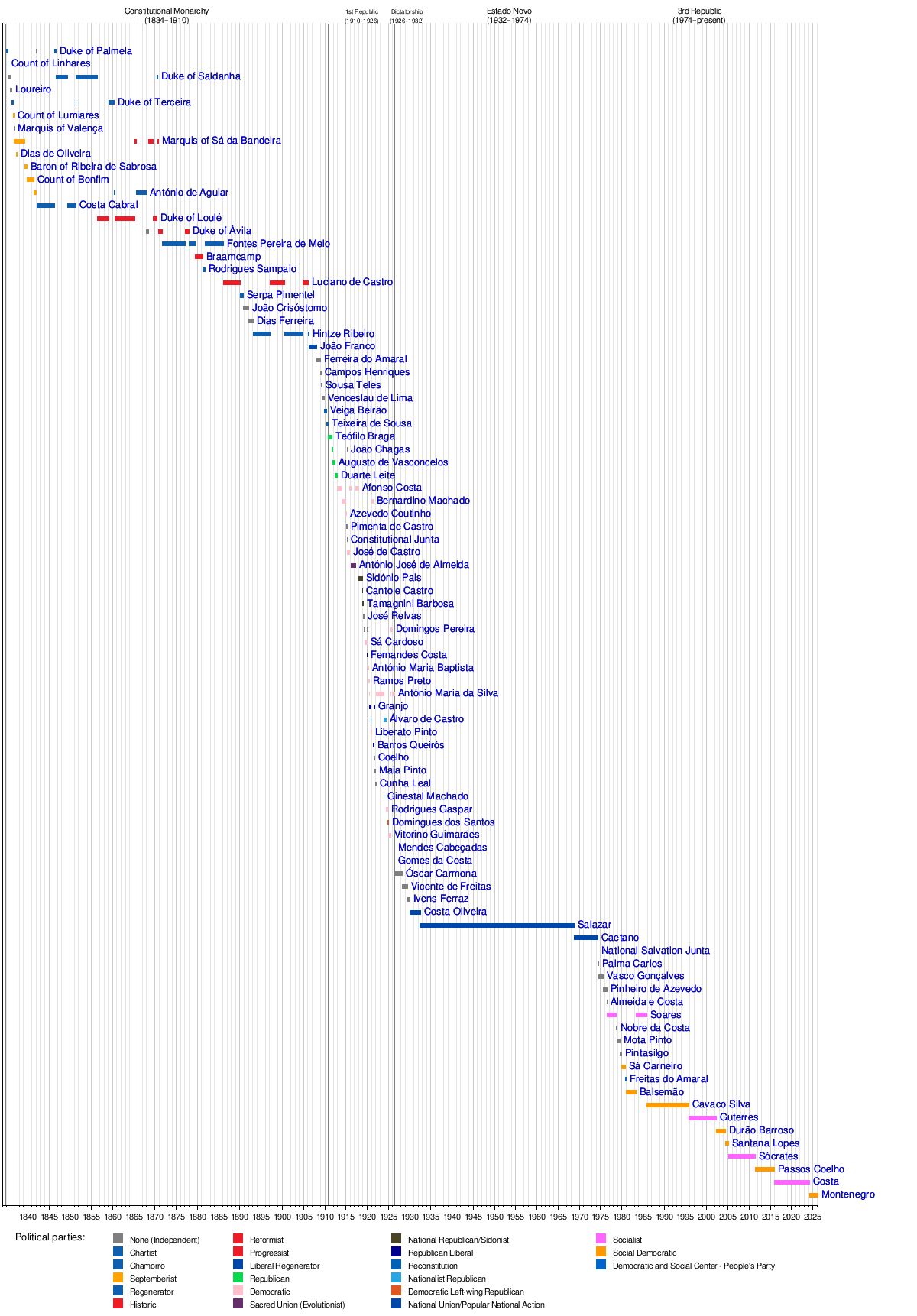
See also
- List of prime ministers of Portugal by time in office
- List of presidents of Portugal
- Politics of Portugal
 | Tommie Smith |
 | Simone Manuel |
 | Shani Davis |
 | Simone Biles |
 | Alice Coachman |



